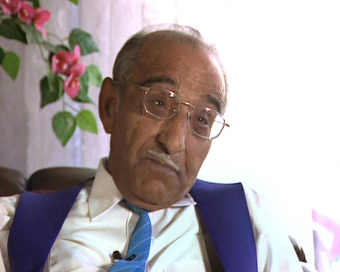Reinhard Florian (*1923)

© (1994–2008) USC Shoah Foundation Institute
“The reality, I mean, the camp life, this brutal past. That stays inside a person. It can never be removed, even if we wanted to, and we would like to forget it—it’s impossible to forget something like that. […] Our life is decided by this brutal past.”[1]
Reinhard Florian was born in a Sinti family in Matheninken, in East Prussia, on February 24, 1923. He grew up there with his parents and eight sisters and brothers. His father was a horse trader, and his mother engaged in itinerant trade. He went to grade school for eight years, in Luisenberg in the Insterburg District, until 1937. That same year, his parents’ right to practice their trade was revoked. His father then had to work at a brickworks, and his mother stayed home with the youngest children. As a “Gypsy,” Reinhard Florian was not allowed to learn a trade and, like his older siblings, was assigned to forced agricultural labor. At the age of 14, he was sent to a large farm 40 kilometers (24 miles) from his home village. Because mail was strictly monitored and visits were banned, he lost contact with his parents; he never saw most of his family again.
In February 1941, Reinhard Florian was arrested by the Gestapo and confined in various prisons all over Germany before being deported to the Mauthausen concentration camp in November of that year. There he had to work in the quarry for three months, and then he was taken to the Gusen concentration camp, where the prisoners’ treatment and living conditions were abysmal. In June 1943, after a four-week quarantine in Auschwitz, he was assigned to the Buna/Monowitz concentration camp, where he worked for I.G. Farben in the “cement detachment” and laid underground cables. He survived the many selections in the Buna/Monowitz concentration camp. His skill at “constructing” beds enabled him to help fellow prisoners pass the bed inspections on a regular basis. That assured him of receiving extra portions of their meal rations, which allowed him to survive. Because he was late for work on one occasion, Reinhard Florian was punished with eight days of confinement in the bunker (camp prison) and mandatory transfer to a subcamp of Auschwitz at Rydułtowy, the Charlottegrube labor camp, where he had to work in a coal mine until January 1945.
On the death march in January 1945, the SS drove Reinhard Florian as far as Loslau, and from there he was deported again, to Mauthausen. Here too, his stay was brief, and he was transported to the subcamp Melk. There Reinhard Florian had a very hard time of it: he lost a great deal of weight and developed tuberculosis. Soon the Americans were approaching the camp, and that caused all the prisoners to be deported to the overcrowded subcamp at Ebensee, where Reinhard Florian barely escaped being shot. There was almost no food left. The Americans liberated the camp on May 6, 1945, and after a short convalescence period, Reinhard Florian went to Bayreuth. He learned that besides his father, only one of his eight brothers and sisters had survived the war. Today Reinhard Florian lives in Aschaffenburg.
(BG; transl. KL)
Reinhard Florian, oral history interview
(German)
















